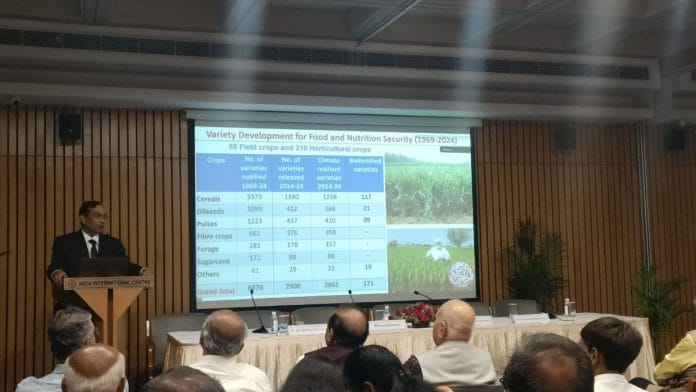The first-ever MS Swaminathan Leadership Dialogue was off to a rousing start on 17 July at Delhi’s India International Centre. Agricultural scientists, geneticists, and academics from across the country gathered to honour the legacy of the father of India’s Green Revolution.
“We’re here to celebrate a true son of India, and also a long-time member of the IIC,” said KN Srivastava, the Director of IIC, at the beginning of the session.
The half-day-long event was held to celebrate the 100th birth anniversary of MS Swaminathan and to honour his contribution to India’s agriculture. However, as the day progressed and various noted figures, including his daughters, Soumya and Madhura Swaminathan, delivered their lectures, it became increasingly apparent that his contribution extended far beyond the realm of agricultural sciences.
The lecture series not only highlighted his role in bringing high-yield variety seeds to India in the 1960s, but also his work toward gender equality, education, access to technology, and the emphasis on centring farmers in India’s growth journey. Paying homage to this wide range of contributions, the event was aptly titled ‘From Green Revolution to Evergreen Revolution.’
The event began with a small clip of Swaminathan’s famous speech from 2013 when he was awarded one of NDTV’s ‘Living Legends’ awards.
“The future belongs to nations with grains and not guns. Guns you can purchase, but grains you cannot,” said Swaminathan in the address.
This clip set the tone for the rest of the day, with speakers such as Renu Swarup, former secretary of the Department of Biotechnology, and Trilochan Mohapatra, former Director General of ICAR. The event also had talks by Sanjay Kumar, Chairman of ASRB, and Ashwani Pareek, Executive Director of NABI, Mohali.
“For those of us who have been fortunate to meet and interact with Dr. Swaminathan, I think we can all attest to this—every interaction with him, no matter how small, felt like you’re learning something new,” sais Swarup, who first met him at the 15th International Congress of Genetics in 1983, when she was still a student.
Swarup was the first to speak, addressing an audience that comprised IIC members, agriculture science students, media, and others familiar with MS Swaminathan’s work. She spoke about how he was one of the few academics who was also an able administrator.
“It is rare to find an academic and a scientist who also knows how the government works, and knows how to get work done,” said Swarup. “He’s responsible for so many outreach initiatives of the Ministry of Science and Technology because he told us to focus on bringing science to the masses.”
Also read: Bharat Ratna to Narasimha Rao and MS Swaminathan dispels the notion of a North-South divide
Contributions beyond agriculture
One recurring theme of the day—Swaminathan’s role as all-rounder—was emphasised greatly by his daughters. Madhura Swaminathan is the head of Economic Analysis at the Indian Statistical Institute, Bengaluru, Soumya Swaminathan is a clinical scientist who served as the chief scientist of the World Health Organisation in 2022. Both of them spoke about how their father donned many hats beyond that of an agricultural scientist.
“My father was not an economist, but I still hear about the impact of his work on economic policy,” said Madhura, in her address over Zoom. “I remember that the first time the issue of women in farming was taken up was during a 1985 IRRI Conference where he was the director,” she added.
For Soumya, her father’s contribution lay in his emphasis on scientific research and rigour.
“One thing my father believed in was to always be open-minded, listen to all points of view and keep yourself updated with the latest developments,” she said to the young members in the audience. “He would say—‘use technology, but don’t be a slave to it.’ I’m sure with AI too, his advice would have been the same.”
Throughout the day, many speakers touched upon Swaminathan’s advice. Be it climate change or the problem of gender inequality in the labour force, every speaker harked back to something Dr. Swaminathan had said about the subject.
Trilochan Mohapatra summed up the sentiments of the event in his address.
“It is so difficult to talk about Dr. Swaminathan. Whether you talk about science, energy, agriculture, equality or gender—he’s already covered those subjects before,” laughed Mohapatra. “And all tributes to him, the world over, will still fall short when compared to his contribution to the world.”
(Edited by Theres Sudeep)






